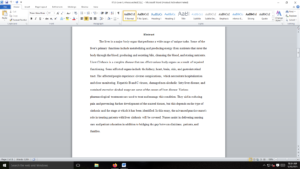pharmacological management of the disease
R135 Liver Cirrhosis.edited(1)
- Pathophysiology of the disease state.
- Review of the pharmacological agents used for treatment and important information related to advanced practice nurse.
Each student will clearly write a title for this topic: For examples, “Pharmacological Effects of Anti-Hypertensive Medications in the Management of Hypertension”.
Submission Instructions:
- The paper is to be clear and concise and students will lose points for improper grammar, punctuation, and misspelling.
- The paper should be formatted per current APA and 5-7 pages in length, excluding the title, abstract and references page.
- Incorporate a minimum of 5 current (published within last five years) scholarly journal articles or primary legal sources (statutes, court opinions) within your work.
Answer preview
The premise that stressors, including addiction and a particular brain region known as the mesolimbic dopamine system, can cause a breakdown in self-control is the foundation of the pathophysiology of the disease state. The mesolimbic dopamine system is in charge of motivation, pleasure, and reward, but drugs have the potential to harm it over time. When someone takes addictive substances or engages in other goal-directed actions, it attempts to create pleasurable experiences. Thus, addicts want this section of the brain to continue functioning normally because it makes life ‘enjoyable.’ An autoimmune hepatitis condition associated may result in cirrhotic patients. Autoimmune diseases and illnesses are not infectious or transmittable. These illnesses develop when your immune system attacks your own cells, leading to irrational physical symptoms. The National Institutes of Health reports that many Americans suffer from an autoimmune disease. Lupus, rheumatoid arthritis, scleroderma, Hashimoto’s thyroiditis, and type 1 diabetes mellitus are the most prevalent autoimmune diseases (DM1).
[1934 Words]

pharmacological management of the disease

